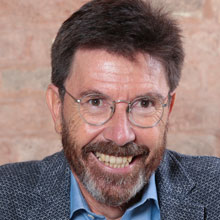Let’s talk about you: what is your background, what do you teach, and what are your research interests?
The scope of my research falls under the large umbrella of Software Engineering. I am especially interested in software analysis and testing techniques, which can be used to obtain information on software behaviour once it has been implemented in an operating environment. These techniques are useful, for instance, to find vulnerabilities that can be exploited to attack systems.
As for teaching, besides "Software Engineering" in the Informatics Bachelor’s Degree Programme, I teach three courses at the Master’s Degree Programme: "Software Correctness, Security and Reliability" for computer scientists and in the business area the courses "Data Programming" and "Networks and IT Systems".
What was your academic career?
I graduated in Mathematics in Padua, where I also took a PhD in computational mathematics and computer mathematics. After that, I did a post-doc in the United States, at Brown University. Then I came back to Italy, after winning a position as a researcher in the newly established degree programme in Informatics in Venice. Four years later I became an associate professor and after another four, at the age of 39, a full professor. At Ca' Foscari, I had the opportunity to hold several positions: degree programme president, department director, interdepartmental school director, PhD coordinator, vice-rector... precious opportunities that gave me the chance to have productive relationships with co-workers from all scientific areas in the university.
What are your professional references?
Informatics has no borders, so in terms of research, the aim is to compete internationally with those who work with software analysis methods and tools.
In terms of teaching, the goal for me is to inspire students, because you only learn if you understand the importance of what you are studying.
On the academic community side, the goal is to contribute to a lively, active, pleasant, stimulating environment. You work best if there is a good cooperative atmosphere, and in this sense my experience at Ca' Foscari has always been extremely positive.
What were your greatest professional satisfactions?
Coordinating a European project, the H2020 Families Share project, has been a wonderful challenge, which has given me a lot, professionally. But my greatest satisfaction is to see my former students and PhD students progress in their human and professional development, both in Italy and abroad.
Which is the area you have always wanted to be involved in but have not yet had the opportunity to explore?
One area I have never 'touched' is digital art... maybe sooner or later there will be a chance to stick my nose in there too!
What is the aspect of your research you are most passionate about?
There is more than just one.... the international scope, the teamwork, the ability to switch from theoretical and mathematical aspects to more technical and implementation aspects, the constant challenge of submitting your work to the judgement of others. The satisfaction of having your work accepted at an international conference, or having an article published in a world-class journal, or having a research project funded is priceless!
Have you always known that this was going to be your path?
Not a chance. In the summer after graduating from high school, I almost drew lots to choose a university degree between Mathematics, Philosophy and Cultural Heritage... then new opportunities, new important meetings and new challenges opened up time after time.
What do teaching and researching mean to you?
The two must go hand in hand. I believe that this is the great challenge for the university: to keep up to date with humility and determination so that our skills are in line with the advance of worldwide scientific production, to keep trying with tenacity and persistence to produce quality scientific results, and to keep passionately passing on to our students not only solid skills but also insights into possible research directions.
Can you offer any advice to researchers in the early stages of their career?
Look around, choose, on an international level, the research centres and the professors where they can be better stimulated and supported in their work. Above all, I take care of your relationships, networks, and opportunities to exchange ideas: research is not something you do alone, it is others who help you give your best.

